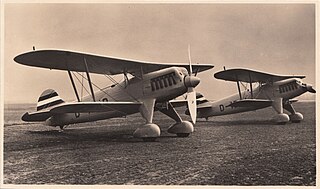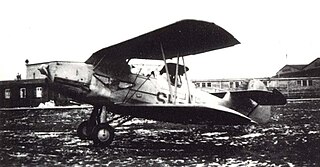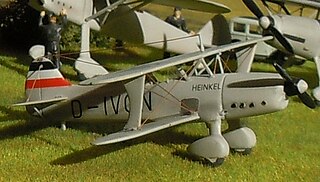
The Arado Ar 80 was a pre-World War II fighter aircraft, designed by Arado Flugzeugwerke to compete for the Luftwaffe's first major fighter contract. The Ar 80 was uninspiring in terms of performance and also suffered a number of failures. The contest was eventually won by the Messerschmitt Bf 109, and the Ar 80 prototypes ended their days as test aircraft.

The Arado Ar 68 was a single-seat biplane fighter designed and produced by the German aircraft manufacturer Arado Flugzeugwerke. It was among the first fighters produced when Germany abandoned the restrictions of the Treaty of Versailles and began rearming.

The Arado Ar 240 was a German twin-engine, multi-role heavy fighter aircraft, developed for the Luftwaffe during World War II by Arado Flugzeugwerke. Its first flight was on 10 May 1940, but problems with the design hampered development, and it remained only marginally stable throughout the prototype phase. The project was eventually cancelled, with the existing airframes used for a variety of test purposes.

The Heinkel He 51 was a German single-seat biplane fighter aircraft. A seaplane variant and a ground-attack version were also developed. It was a development of the earlier He 49.

The Arado Ar 64 was a single-seat biplane fighter designed and produced by the German aircraft manufacturer Arado. It was among the first fighters produced when Germany abandoned the restrictions of the Treaty of Versailles and began rearming.

The Arado Ar 65 was the single-seat biplane fighter successor to the Ar 64. Both looked very similar. The only major difference was the use of a 12-cylinder inline engine versus the Ar 64's radial. The wingspan was also increased.

The Arado Ar 66 was a single-engined twin-seat training biplane designed and produced by the German aircraft manufacturer Arado. It was the last aircraft to be designed by the aeronautical engineer Walter Rethel in collaboration with Arado.

The Fieseler Fi 167 was a 1930s German biplane torpedo and reconnaissance bomber designed for use from the Graf Zeppelin class aircraft carriers under construction from 1936 to 1942.

The Henschel Hs 124 was Henschel's entry into the Luftwaffe's twin-engine Kampfzerstörer requirement, but was abandoned after this programme was split into separate Zerstörer and Schnellbomber requirements. Three prototypes were planned, but only two were built

The Arado Ar 197 was a German World War II-era biplane, designed for naval operations for the never-completed German aircraft carrier Graf Zeppelin. Only a few prototypes were built; the project was abandoned in favour of the Messerschmitt Bf 109T and Me 155.

The Arado Ar 195 was a single-engine prototype carrier-based torpedo bomber, built by the German firm Arado for service on the German aircraft carrier Graf Zeppelin, during World War II.

The Arado Ar 76 was a German aircraft of the 1930s, designed as a light fighter with a secondary role as an advanced trainer in mind.

The Heinkel He 74 was a light fighter aircraft developed in Germany in the early 1930s. It was a conventional, single-bay biplane with staggered, unequal-span wings braced with an I-type interplane strut. The pilot sat in an open cockpit, and the undercarriage was of the fixed, tailskid type.

The Blohm & Voss Ha 140 was a German multi-purpose seaplane first flown in 1937. It was intended for use as a torpedo bomber or long-range reconnaissance aircraft but did not enter production.
The Heinkel Doppeldecker 43 was a prototype German fighter aircraft of the 1930s. A single-engined, single-seat biplane, the HD 43 was designed to meet a secret German Reichswehr requirement for a single-seat fighter. It had two-bay wooden wings with a steel-tube fuselage, and was powered by a 750 hp (600 kW) BMW VI engine. The single prototype flew in 1931.

The Arado Ar 81 was a German prototype dive bomber. Because the Reich Air Ministry decided to purchase the competing Junkers Ju 87, only three prototypes of the Ar 81 were completed.

The Henschel Hs 125 was a German advanced training aircraft prototype featuring a single engine and low wing, designed by Henschel & Son and tested by the Luftwaffe in 1934. Only two prototypes were ever built.

The Arado Ar 198 was a prototype reconnaissance aircraft, developed by Arado Flugzeugwerke, with backing from the Luftwaffe, who initially preferred it over the Blohm & Voss BV 141 and the Focke-Wulf Fw 189. However, when flight tests were carried out the aircraft performed poorly and did not impress the Luftwaffe. One aircraft was completed in 1938.
The Arado Ar 69 was a two-seat German beginner's school and sport biplane with an open cockpit, developed in 1933 by Arado Flugzeugwerke.

The Arado Ar 77 was a German twin-engined monoplane, designed as an advanced training aircraft from 1934.


















